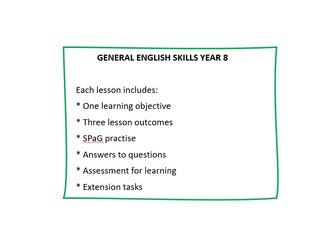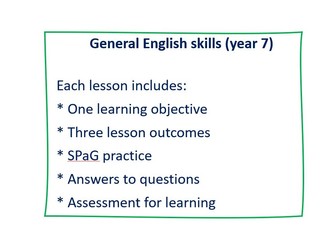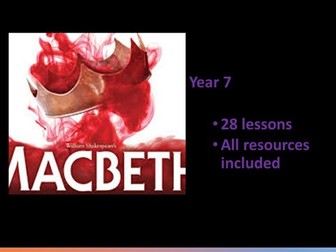GENERAL ENGLISH SKILLS YEAR 8
<p>These lessons are created for online learning. However, they are more than suitable for classroom teaching. These lessons are more suited for ages 11-13, and are incredibly engaging, with plenty of quick and snappy questions and tasks.</p>
<p>Each lesson includes:</p>
<ul>
<li>One learning objective</li>
<li>Three lesson outcomes</li>
<li>SPaG practice</li>
<li>Answers to questions</li>
<li>Assessment for learning</li>
<li>Extension tasks</li>
</ul>
<p>Here are the learning objectives:</p>
<ol>
<li>What strategies can we use to identify and correct common spelling errors and improve the accuracy of our written work?</li>
<li>How do we analyse and revise sentences to ensure proper subject-verb agreement and clear sentence structure?</li>
<li>How can we develop strong thesis statements and topic sentences in our essay writing?</li>
<li>How do we incorporate varied and precise vocabulary into our writing to enrich the quality of both fiction and non-fiction texts?</li>
<li>What are the essential steps in the proofreading process, and how do we apply them effectively to catch and correct errors in our work?</li>
<li>What is the role of cohesive devices like transitional words and phrases in maintaining a smooth flow and organisation in our texts?</li>
<li>Based on your own skills, can you create a reflective, personalised list to look out for when proofreading?</li>
<li>How can you plan quickly and effectively for a creative writing task?</li>
<li>What is phonology and how do I identify examples of it?</li>
<li>What is the effect of alliteration, assonance and sibilance in fiction and non-fiction texts?</li>
<li>What strategies can we employ to speak clearly and confidently in different situations, adjusting our tone and volume to suit the audience and context?</li>
<li>How can we use advanced punctuation in our non-fiction writing to make it more accurate and better quality?</li>
</ol>
<p>I hope you enjoy!</p>


